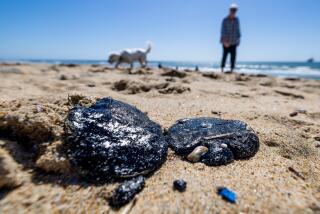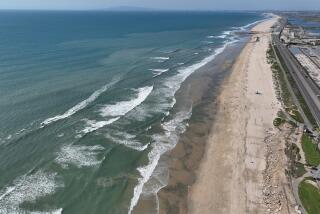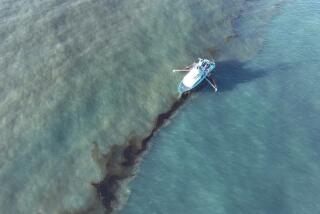Tar balls reach Texas as stormy weather hampers cleanup
- Share via
Reporting from Atlanta and Venice, La. — Oil from the Deepwater Horizon spill was reported for the first time on the beaches of Texas as high seas and stormy weather on Monday plagued new cleanup plans in the Gulf of Mexico, including the test deployment of a 1,100-foot “super skimmer” ship.
The weather prevented skimming operations for the eighth consecutive day off the coasts of Mississippi, Alabama and Florida. Along the Louisiana coast, a storm system made landfall Monday afternoon, bringing thunderstorms and grounding skimming boats operating close to shore.
More rough seas are likely later in the week, with a tropical system churning east of the Yucatan Peninsula in Mexico that may head north and strike eastern Texas and western Louisiana late Wednesday, according to AccuWeather.com.
“This region is an open highway for the system to ride more to the north, rather than to the west, like Alex did recently,” AccuWeather meteorologist Alex Sosnowski wrote Monday.
The spill, gushing as much as 60,000 barrels of oil a day, is about 50 miles from the mouth of the Mississippi River. Sosnowski said the system would probably become a tropical storm at the least and had the possibility of creating squalls that could disrupt the oil containment and cleanup efforts.
In Texas, officials confirmed Monday that they found a small number of tar balls on beaches in Galveston and nearby Bolivar Peninsula. They were tested and found to be from the Deepwater Horizon spill.
“I think altogether they filled up a couple of buckets full of them; it was not a huge impact,” said Jim Suydam, a spokesman for the Texas General Land Office. “We think we’ll be able to contain any impact from Deepwater to tar ball pickup on the beach.”
High seas over the weekend also hampered the 48-hour test run of the so-called super skimmer, a retrofitted 1,100-foot tanker called the A Whale, which officials hope will eventually be able to suck up 300,000 barrels of oil every 10 hours.
Bob Grantham, a spokesman for boat owner TMT Shipping Offshore, said Monday that the weekend tests were “inconclusive in the light of the rough sea state we are encountering.” He said the company and the Coast Guard would continue tests.
The ship was converted from a tanker to a skimmer in Lisbon. It employs a process that allows an oil-water mixture to enter through slits near the front of the ship, sending it through a series of tanks that separate the oil from the water.
The ship is one of a number of tools being thrown into the mix as part of an ever-growing effort that includes 44,500 workers and has cost BP about $3.12 billion. The company has bought centrifuges from actor Kevin Costner, and it has shipyards cranking out something called a Heavy Oil Recovery Device, or HORD, the invention of a tanker captain. The devices are designed to collect oil too heavy for skimmers.
A Navy blimp, the MZ-3A Airship, is on its way to the gulf from Yuma, Ariz. According to the Defense Transportation Journal, the airship program, decommissioned by the Navy in 1962, was resurrected in March for science projects.
In the gulf, the 178-foot airship will stay close to the shore, helping skimmers find patches of oil and keeping an eye out for marine mammals and other wildlife.
Much of the new technology, however, requires the cooperation of nature.
In Venice, La., a hub of the cleanup effort, heavy-lift helicopters clattered overhead and rusting fishing trawlers, shrimpers and other boats loaded thousands of feet of oil booms and other supplies early Monday. But skies soon turned ominously dark, and fierce squalls raked the area.
By late morning, a small armada of skimmers and other vessels that had been working near the spill site were ordered back to port as a storm front moved in. Two tugboats still planned to tow a floating 300-bed bunkhouse to the site, 63 miles away, to provide more sleeping quarters for crews and to augment command and control of the cleanup operation.
Fausset reported from Atlanta and Drogin reported from Venice, La.
More to Read
Sign up for Essential California
The most important California stories and recommendations in your inbox every morning.
You may occasionally receive promotional content from the Los Angeles Times.











